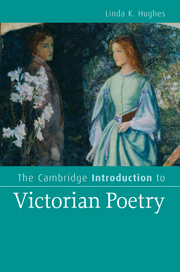Book contents
- Frontmatter
- Contents
- List of figures
- Preface
- Acknowledgments
- Editions cited
- Introducing Victorian poetry
- Part I The forms of Victorian poetry
- Part II The rhetoric of Victorian poetry
- Introduction to Part II
- 4 Poetry, technology, science
- 5 Poetry and religion
- 6 Poetry and the heart's affections
- 7 Poetry and empire
- 8 Poetic liberties
- 9 Resisting rhetoric: art for art's sake
- Part III Coda Close readings
- Glossary
- Notes
- Further reading
- Index
- Cambridge Introductions to Literature
Introduction to Part II
Published online by Cambridge University Press: 05 June 2012
- Frontmatter
- Contents
- List of figures
- Preface
- Acknowledgments
- Editions cited
- Introducing Victorian poetry
- Part I The forms of Victorian poetry
- Part II The rhetoric of Victorian poetry
- Introduction to Part II
- 4 Poetry, technology, science
- 5 Poetry and religion
- 6 Poetry and the heart's affections
- 7 Poetry and empire
- 8 Poetic liberties
- 9 Resisting rhetoric: art for art's sake
- Part III Coda Close readings
- Glossary
- Notes
- Further reading
- Index
- Cambridge Introductions to Literature
Summary
This world's no blot for us,
Nor blank; it means intensely, and means good:
To find its meaning is my meat and drink.
“Ay, but you don't so instigate to prayer!”
Strikes in the Prior: “when your meaning's plain
It does not say to folk – remember matins,
Or, mind you fast next Friday!” Why, for this
What need of art at all?
Robert Browning, “Fra Lippo Lippi” (1855)W. B. Yeats famously asserted of Victorian poetry, “My generation, because it disliked Victorian rhetorical moral fervour, came to dislike all rhetoric. In France, where there was a similar movement, a poet had written, ‘Take rhetoric and wring its neck.’” Yeats had some grounds for associating Victorian poetry with rhetoric. For example, “Dover Beach” (1867), Matthew Arnold's famous meditation on the relation of erotic love to human mortality and uncertainty, has seemed forced to some readers. Walt Whitman objected to Arnold as a “dude of literature,” and the poem's diction has seemed unnecessarily fine to others. In this context “rhetoric” signifies inflated language and unearned ponderousness. Having contrasted the waves' constant breaking on shore to a steadily ebbing “sea of faith” in prior stanzas, Arnold's speaker concludes,
Ah, love, let us be true
To one another! for the world, which seems
To lie before us like a land of dreams,
So various, so beautiful, so new,
Hath really neither joy, nor love, nor light,
Nor certitude, nor peace, nor help for pain;
And we are here as on a darkling plain
Swept with confused alarms of struggle and flight,
Where ignorant armies clash by night.
(29–37)- Type
- Chapter
- Information
- The Cambridge Introduction to Victorian Poetry , pp. 113 - 117Publisher: Cambridge University PressPrint publication year: 2010

